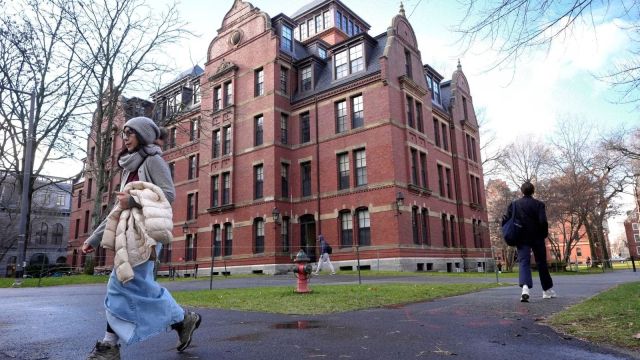Stay updated with the latest - Click here to follow us on Instagram
$1 billion annual revenue cut for Harvard? Trump’s budget threats loom over Ivy giant
The projected deficit assumes a worst-case scenario for Harvard: total loss of federal research grants and student aid, a ban on international students, and an increase in the endowment tax from 1.4 per cent to 8 per cent.
 Harvard has not yet issued a comment on the latest development. (File Photo)
Harvard has not yet issued a comment on the latest development. (File Photo)Harvard University is bracing for financial turmoil. If US President Donald Trump’s proposed plans targeting elite institutions move forward, the Ivy League giant could face a budget shortfall of about $1 billion per year, reports The Wall Street Journal, citing an analysis based on publicly available data.
The projected deficit assumes a worst-case scenario: total loss of federal research grants and student aid, a ban on international students, and an increase in the endowment tax from 1.4 per cent to 8 per cent.
While Harvard boasts a $53 billion endowment, over 80 per cent of those funds are donor-restricted and can’t be redirected to cover general operating expenses without legal risk. With an annual operating budget of $6.4 billion, WSJ notes, a sustained shortfall of that magnitude would be a serious blow.
“They’ve got enough money to keep going for a while, but eventually they’re going to have to make substantial cuts,” said Robert Kelchen, an education finance professor at the University of Tennessee, Knoxville. “You would change the future of the institution.”
Negotiation and cuts
After months of legal and rhetorical defiance, Harvard has reportedly moved toward behind-the-scenes negotiations with the Trump administration. According to a June post by President Alan Garber, discussions had resumed as recently as mid-month.
The White House this week accused Harvard of violating federal civil rights laws in its handling of antisemitism on campus. “The school will receive no money until it ends its discriminatory and deeply embarrassing practices,” a senior White House official told WSJ, adding that the private sector was welcome to step in and support Harvard instead.
In response, Harvard said it had made “significant strides to combat bigotry, hate and bias,” but added that the work was ongoing.
Trump’s administration has already revoked multiyear research grants worth $700 million annually. The cuts have jeopardized studies in areas such as breast cancer, colon cancer, pediatric HIV, and limb regeneration, according to a June court filing cited by WSJ.
Harvard has been unable to fully replace the lost funding internally. Though it has over $3 billion in cash reserves and borrowed $750 million in April, the university has only earmarked $250 million so far to bridge the research funding gap. It has frozen new hires, and some schools — including the Kennedy School — are cutting staff and departmental budgets.
Endowment tax hike, IRS threat and donors
The proposed 8 per cent endowment tax — up from 1.4 per cent— is another major threat. Trump has also called for revoking Harvard’s tax-exempt status, potentially forcing the university to pay property taxes and making charitable giving less attractive for donors.
In recent years, the endowment has funded over a third of Harvard’s operating budget. A one-time decision by the Harvard Corporation to increase the draw from unrestricted endowment funds could offer temporary relief, but such a move carries long-term risks.
Some major donors, including billionaire Len Blavatnik, have contributed large gifts — Blavatnik recently donated $19 million to Harvard Medical School. But others have withheld donations, particularly after the Oct. 7 Hamas attack on Israel, demanding stronger action on antisemitism or more robust free speech policies.
Groups like the 1636 Forum have encouraged alumni to continue giving — but with earmarked conditions.
Garber has launched a new Presidential Priorities Fund aimed at creating flexible resources. “I am grateful to everyone who stands with Harvard as we continue to pursue our mission,” he wrote in a May appeal to donors.
Adding to the financial complexity, Harvard has increased its exposure to private equity, which now makes up 39 per cent of the endowment (up from 20 per cent in 2019). These investments are less liquid than traditional stocks or bonds. According to WSJ, Harvard this spring sold $1 billion worth of private-equity holdings at a 7 per cent discount, reflecting the need for cash flow in uncertain times.
Over the next decade, Harvard is also on the hook for more than $12 billion in previously committed private-equity capital — obligations that fund managers can call in at any time.
A legal win is not enough
Even if courts rule in Harvard’s favour on pending lawsuits — including the ban on international students — the future of federal research support is far from guaranteed.
As Aziz Huq, a law professor at the University of Chicago, told WSJ, “Trump might not have the legal authority to take away research dollars that already have been promised to Harvard. But going forward, his administration could simply not promise the money again.”
“It’s that threat that’s looming,” Huq added.
“Harvard is peering over the precipice,” said Ted Mitchell, president of the American Council on Education, as quoted by WSJ. If Harvard loses its court battles, “Harvard and American education will suffer a severe, perhaps irreparable blow.”
- 01
- 02
- 03
- 04
- 05































